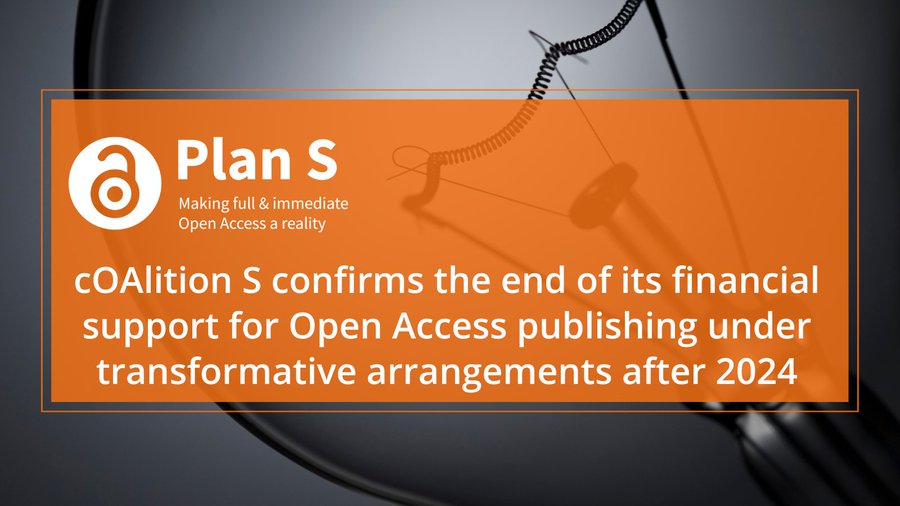cOAlition S confirma el final de su apoyo financiero para la publicación de acceso abierto bajo acuerdos transformativos después de 2024.
En septiembre de 2018, un grupo de organizaciones nacionales de financiación de la investigación, con el apoyo de la Comisión Europea y el Consejo Europeo de Investigación (ERC), anunció el lanzamiento de cOAlition S, una iniciativa para hacer realidad el acceso abierto completo e inmediato a las publicaciones de investigación. . Se basa en el Plan S, que consta de un objetivo y 10 principios. Con fecha actual cOAlition S confirma el final de su apoyo financiero para la publicación de acceso abierto bajo acuerdos transformativos después de 2024. Ver noticia

cOAlition S confirms the end of its financial support for Open Access publishing under transformative arrangements after 2024 Transformative arrangements – including Transformative Agreements and Transformative Journals – were developed to encourage subscription journals to transition to full and immediate open access within a defined timeframe (31st December 2024, as specified in the Plan S Implementation Guidance). After careful consideration of the outcomes of transformative arrangements, the leadership of cOAlition S reaffirms that, as a principle, its members will no longer financially support these arrangements after 2024. Exceptionally, individual cOAlition S funders may still choose to financially participate in Transformative Agreements beyond 2024 as part of their respective national strategies. Such exceptions will be communicated on the cOAlition S website.
Support for Transformative Journals will also cease at the end of 2024. In anticipation of this, no new applications to this programme will be considered after the 30th of June 2023.
Why financial support ends
Plan S was launched in 2018. At that time, cOAlition S recognised that transformative arrangements would provide a useful means to repurpose funds for journal subscriptions to publication fees, thus supporting legacy publishers in transforming paywalled to Open Access publication models. It was, however, also clear that the transformation would have to be completed at a definite point in time, by the end of 2024 at the latest. We maintain this timeline. We believe that the strategy of providing financial support for these arrangements – endorsed by many cOAlition S members – beyond 2024 would significantly increase the risk that these arrangements will become permanent and perpetuate hybrid Open Access, which cOAlition S has always firmly opposed.
This position on the hybrid model of Open Access is in line with the principles and statements of the research performing organisations participating in the OA2020 initiative and the understanding that the current global investment in subscriptions is more than enough to support the transition of today’s academic journals to Open Access.
Transformative Agreements remain an instrument that is in the remit of library consortia to pursue. We continue to recognise that articles published via such arrangements in Open Access with CC BY allow full compliance with Plan S requirements.
We encourage library consortia to consider including in any future publishing agreements the requirement that publishers make their prices transparent, for example, through the Plan S Journal Comparison Service, and that they support authors’ rights retention.
Towards new Open Access initiatives
To help secure a fair and equitable open access landscape – and mindful that Funders’ budgets are finite – cOAlition S members will direct their efforts to more innovative and community-led Open Access publishing initiatives that aim to deliver full and immediate Open Access in a shorter timeframe. To incentivise subscription publishers to transition to full and immediate Open Access, we will also encourage the development of Full-OA Publishing Agreements, which support the publication in venues that make all peer-reviewed research articles immediately Open Access. Individual cOAlition S funders may financially contribute to such agreements negotiated between institutions, library consortia, and publishers.
 El depósito de los datos de investigación en acceso abierto siempre que sea posible, es una de las prioridades que, en el contexto de la ciencia abierta, se han marcado las entidades que financian proyectos de investigación, así como las propias universidades y organismos de investigación, tal y como se recoge en la Ley 17/2022 de la Ciencia, la Tecnología y la Innovación, y en los programas europeos Horizonte 2020 y Horizonte Europa. Con el fin de propiciar que los conjuntos de datos respondan a los principios FAIR (localizables, accesibles, interoperables y reutilizables), contribuir a la reproducibilidad de los resultados de investigación, incrementar la eficiencia y el avance del conocimiento, se han creado infraestructuras y dictado políticas para alcanzar estos objetivos. Con el objetivo de conocer dónde depositan los datos nuestros investigadores nos propusimos hacer un muestreo mediante la búsqueda de conjuntos de datos de investigación en las instituciones de distinto tamaño y características que elaboran este informe: Consejo Superior de Investigaciones Científicas (CSIC), Universidad de Alcalá (UAH), Universidad Pública de Navarra (UPNA), Universidad Pablo de Olavide (UPO) y Universidad Politécnica de Valencia (UPV).
El depósito de los datos de investigación en acceso abierto siempre que sea posible, es una de las prioridades que, en el contexto de la ciencia abierta, se han marcado las entidades que financian proyectos de investigación, así como las propias universidades y organismos de investigación, tal y como se recoge en la Ley 17/2022 de la Ciencia, la Tecnología y la Innovación, y en los programas europeos Horizonte 2020 y Horizonte Europa. Con el fin de propiciar que los conjuntos de datos respondan a los principios FAIR (localizables, accesibles, interoperables y reutilizables), contribuir a la reproducibilidad de los resultados de investigación, incrementar la eficiencia y el avance del conocimiento, se han creado infraestructuras y dictado políticas para alcanzar estos objetivos. Con el objetivo de conocer dónde depositan los datos nuestros investigadores nos propusimos hacer un muestreo mediante la búsqueda de conjuntos de datos de investigación en las instituciones de distinto tamaño y características que elaboran este informe: Consejo Superior de Investigaciones Científicas (CSIC), Universidad de Alcalá (UAH), Universidad Pública de Navarra (UPNA), Universidad Pablo de Olavide (UPO) y Universidad Politécnica de Valencia (UPV).
